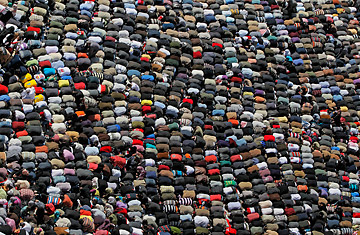
Tens of thousands of Egyptians gather during celebrations of Hosni Mubarak's fall from power to pray — and to maintain pressure on the current military rulers — in Tahrir Square in Cairo on Feb. 18, 2011
Kamel Abdullah took the pages of the free antigovernment newspaper he'd just been handed and carefully laid them on the ground in front of him as a makeshift prayer mat. The beefy 50-year-old with a prominent zabibe, or callused prayer bump, on his forehead stood shoulder to shoulder with the hundreds of thousands of other Egyptians who poured into Cairo's Tahrir Square on Friday, Feb. 18, a week after the ouster of President Hosni Mubarak, to hear one of Sunni Islam's most influential clerics deliver his first sermon in decades on home soil after having been driven into exile by Mubarak.
The Thursday-night return from Qatar of the immensely popular Sheik Yusuf al-Qaradawi, who is close to the still proscribed Muslim Brotherhood, has further enlivened a once stagnant political scene now brimming with a growing spectrum of ideological diversity. His center-stage role in Friday's demonstration may also raise the discomfort of some in Washington over the role Islamists are likely to play in Egypt's nascent democracy.
"I congratulate the youth," al-Qaradawi said from the balcony of a nearby building. "The revolution isn't over — it continues, and we must participate in the new Egypt. Be patient and preserve your revolution."
The aging cleric also had a warning for other Arab regimes currently facing outbursts of the long-suppressed wrath of their citizenries: "You can't stop history. The Arab world has changed from within. Don't stand against your people. Try and understand them."
The sound system in the vast square faltered several times, reducing al-Qaradawi's voice to a near whisper, but few in the mass crowd stirred. There was pin-drop silence during a stirring 30-min. sermon that was largely political but also personal, as the cleric recounted how his granddaughter had joined protesters in Tahrir, sweeping the streets and repainting graffitied walls.
The theologian, popularized on al-Jazeera through his weekly religious-affairs program, called on Egypt to maintain the nonsectarian unity shown throughout the uprising that ousted Mubarak, and while he praised the military, he also demanded that it "liberate" Egyptians from "this government that Mubarak formed," immediately release political prisoners and, in a move that would frazzle Israelis, reopen the Rafah border crossing with Gaza.
But if he was pressing the military rulers to whom Mubarak had handed power just a week earlier, al-Qaradawi also offered them help, lending his considerable political and moral authority to efforts to end the ongoing strike wave by hundreds of thousands of Egyptians by urging them to "support this revolution by returning to work."
